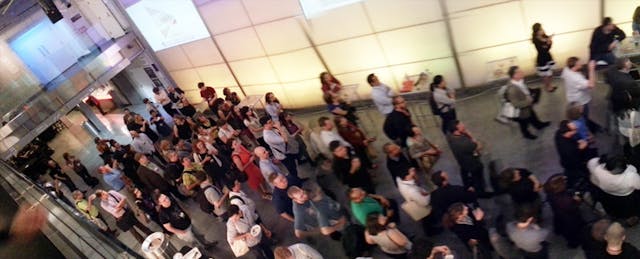Under the hustle and bustle of Midtown Manhattan gathered a gaggle of game enthusiasts for the 10th Games for Change Festival. This bonanza of roughly 800 developers, designers, educators, researchers showed off the projects that spanned the gamut from education to environment and history to human rights.
Amplify, the education division of News Corp., made its presence loud and clear at the conference, beginning with the announcement of its suite of 30 games targeting middle-school language arts and STEM subjects. Amplify’s VP of games, Justin Leites, declared at the company presentation that it is going for “Big G” games that reward extended play and are voluntary such they’ll be played outside the classroom. (“Big G” is a term coined by ASU professor James Gee for games that encourage players to establish affinity spaces where users interact outside of the game medium on places like online forums.)
The game demos from seven of Amplify’s game designers certainly showed off the polish found in mainstream (even AAA) titles. Mechanics varied from match-3, role-playing, dueling cards (think Magic the Gathering), and what renowned game expert and designer Jesse Schell called a “cross between kingdom hearts and pokemon but with literary characters” as he described his contribution to the suite Lexica.
Despite the quality of these games, some, like James Gee himself, wondered if relying extensively on game mechanics from commercial titles might actually be a disservice to learning about how the materials actually operate in real life. He asked during the audience Q&A, “what do kids eventually have to un-learn from the learning processes built into these games?” The question stumped panelists a bit--and it’s a worthy challenge for any future educational game designer.
There was also one tell-tale confession at the panel: the games haven’t been thoroughly tested by teachers in the classrooms. For the developers, this seemed to be a secondary afterthought--or at least one that they counted on Amplify to solve.
Other notable developments to be covered in a more comprehensive, post-conference wrap-up, include:
- E-Line Media, a learning games publisher most widely known for Gamestar Mechanic, has partnered with the Cook Inlet Tribal Council (CITC) to launch the “first indigenous-owned video game company in the U.S.)”--Upper One Games. The first game will be focused on social studies, which CITC President and CEO, Gloria O’Neill and E-Line Media founder and president, Alan Gershenfeld, say will draw from Alaskan native folklore to create gameful, educational experiences that transcend cultures and bring history to life.
- Filament Games has hired a new CEO, Lee Wilson (previously President of the Association of Educational Publishers) as it “doubles down on the institution (K-12) market,” shared former CEO and now-executive producer Dan White.
- Valve, which has taken baby steps at introducing Portal 2 into schools, is considering bring some of educational titles onto its Steam platform, shared Tom Giardino, who manages the company’s education efforts and public relations. This could potentially be a great commercial distribution opportunity for educational game developers that meet the quality bar of AAA titles.
The second evening wrapped up with the the Games for Change awards:
- Most Innovative: Blindside
- Most Significant Impact: Data Dealer
- Best Gameplay: Reach for the Sun
- Game Changer Award: Jesse Schell
- Game of the Year: Quandary


